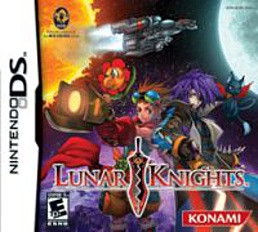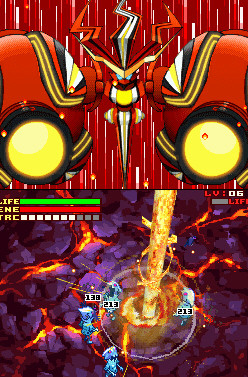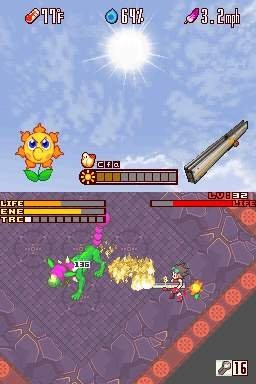Game Review
by Andrew Yoon,Lunar Knights
Nintendo DS
| Description: |  |
||
The latest creation from Kojima Productions, the creators of the Metal Gear Solid series, has players fighting a bloodthirsty race of vampires that is waging war against humanity. With Casket Armor and paraSOL technologies at hand, the vampires have been able to control the weather, and block out the world's sunlight. As humanity falls to slavery, two boys, Aaron and Lucian, will unleash the powers of their legendary weapons to fight the vampire empire. |
|||
| Review: | |||
You won't see any admission of it on the game packaging, but Lunar Knights is a sequel to a cult-favorite Game Boy Advance franchise called Boktai. The GBA classics had players fighting vampires with a clever twist: by using real sunlight, captured by the cartridge's physical solar sensor. The clever gameplay mechanic proved to be too limiting for some, especially gamers that had limited access to constant sunlight. Lunar Knights attempts to revive the classic Boktai franchise for the new DS audience. The basic premise is the same: you play as a youthful lad that must fight vampires. Like the GBA original, there is a day-night cycle. However, there's one, crucial omission: the solar sensor. Lunar Knights, therefore, becomes instantly more accessible for gamers that want to play at their own pace. Although this will benefit many gamers, the core gameplay mechanics of the series isn't complex or compelling enough without the admittedly gimmicky quality of finding sunlight. However, the lack of the solar sensor isn't the only retread for Lunar Knights: even the primary gameplay mechanics seem like a backwards step for the series. The original Boktai had a more Kojima-esque focus on stealth, as opposed to action. With resources truly limited, the game encouraged players to avoid battle, and prepare for a chilling boss battle at the end. The experience felt a bit more cerebral, with gamers forced to carefully traverse dungeons, and face a number of puzzles. Much to this reviewer's chagrin, Lunar Knights takes a far more action-oriented approach to the series. This has interesting repercussions for the overall quality of the game. The isometric perspective retained from Boktai does not perform as well when the game becomes primarily action-oriented. It becomes much more difficult to judge where enemies are, and characters feel far less agile. There are options to change the diagonal controls, but none are truly intuitive. Thankfully, the main combat doesn't use tacked-on touch screen controls that might have aggravated the player even further.
Switching to an action-oriented approach reveals the shallow nature of the combat. Locking on with R and pressing Y repeatedly becomes very grating after minutes. There are multiple weapons and characters, but neither provides a compelling experience: there's no real depth to the combat. It's true that there are tactical advantages to switching between the two characters, as you will frequently hit SELECT to swap between the two. However, there are no real combos, and the weapons effects don't feel significant. There are noteworthy additions to the gameplay that do add to the experience. The ability to change weather at a moment's notice does add some nice depth to the various dungeons. Also, there are a ton of optional side quests to find throughout the towns. But, no matter how many quests you embark on, they ultimately boil down to a repetitive, uninspired button masher. One of the more unnecessary additions to the game has to be the space shooting segments. These sequences, which occur at the end of boss battles, are puzzling at best. Not only is it incredibly disruptive to the flow of the game, it is simply not very good as well. The controls are counter-intuitive: both shooting and movement are controlled with the stylus. This creates an unfortunate problem where you cannot shoot and move at the same time. Although the rest of Lunar Knights can be played with the D-Pad, these shooter sections must be played with the stylus, and they suffer a great deal due to this unnatural mechanic. As a shooter, it's uninspired—the graphics are primitive, at best, and the enemy designs leave a lot to be desired. The incredible production values of Lunar Knights can be commended, but the execution is so amateurish that the game would've been better without the unnecessary extras. Voice acting, for example, is immediately grating. The character designs suffer from generic anime syndrome: this stuff is worse than the average Saturday morning fare. The copious amounts of dialog become instantly tiresome. Thankfully, the player can hold down B to skip through the text faster. There are full-motion anime cutscenes littered throughout the game, but with such uninspired characters and shoddy dialog, the value of such cinemas seems diminished. Lunar Knights is the kind of game that wants to be loved. It's not that the game plays horribly; it doesn't. However, the game simply doesn't offer enough variety or innovation to capture a player's attention for too long. Underneath the boring characters and lackluster voice acting is an interesting story: too bad the game doesn't do much to encourage the player to actually find out. |
|
The views and opinions expressed in this article are solely those of the author(s) and do not necessarily represent the views of Anime News Network, its employees, owners, or sponsors.
|
| Grade: | |||
Overall : C+
Graphics : B+
Sound/Music : C
Gameplay : C+
Presentation : C
+ Fantastic sprites. Accessible gameplay. Impressive anime cutscenes. Great music. |
|||

